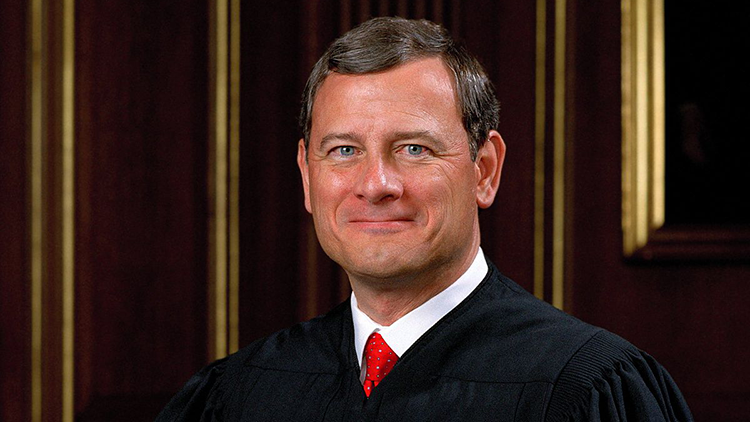Chief Justice Roberts declines to meet with Democrats about court ethics

Chief Justice John Roberts Jr. (Photo from the U.S. Supreme Court)
Chief Justice John G. Roberts Jr. on Thursday turned down an invitation to meet with Senate Democrats to discuss what the lawmakers called an “ethics crisis” at the Supreme Court following reports of two politically charged flags displayed outside the homes of Justice Samuel A. Alito Jr.
In a two-paragraph letter to Sens. Dick Durbin (Ill.) and Sheldon Whitehouse (R.I.), Roberts said such a meeting would be “inadvisable” in part because of the importance of preserving judicial independence.
“The format proposed—a meeting with leaders of only one party who have expressed an interest in matters currently pending before the Court—simply underscores that participating in such a meeting would be inadvisable,” Roberts told Durbin and Whitehouse, who oversee the federal courts in their respective roles as chairmen of the Senate Judiciary Committee and a judicial oversight subcommittee.
The communication from the chief justice follows Alito’s rejection one day earlier of calls for his recusal from two major Jan. 6-related cases at the Supreme Court. Dozens of Democratic lawmakers and some legal experts had questioned whether Alito could avoid the appearance of bias after reports about the display of flags embraced by rioters who attacked the U.S. Capitol on Jan. 6, 2021.
Democrats asked Roberts to ensure Alito would not participate in deciding those cases, which the court is scheduled to rule on in the coming weeks. One involves whether former president Donald Trump may be criminally prosecuted for his efforts to remain in office after losing the 2020 election; another asks whether the Justice Department can use an obstruction charge to prosecute more than 300 Jan. 6 rioters.
While Roberts holds the title of chief and presides over the high court and the federal judiciary, his power over his fellow justices is quite limited. He did not address the flag controversy in his letter Thursday, instead noting that individual justices decide for themselves whether to recuse and have followed that practice for 235 years. There is no process to appeal a justice’s determination.
Democrats in the House and Senate have backed legislation that would impose a stricter ethics policy on the Supreme Court, including an independent enforcement and oversight mechanism. Republicans oppose the measure, dismissing the effort as motivated by political opposition to the court’s conservative supermajority.
A spokesperson for Durbin rebutted Roberts’s assertion that it would be improper for the justice to meet with members of Congress.
“To the contrary, Chair Durbin’s only interest—as it has been since he first raised this issue with the Chief Justice 12 years ago—is restoring the credibility of the Court in the eyes of the American people,” spokeswoman Emily Hampsten said in a statement, adding that Durbin would continue to press for legislation establishing an enforceable code of conduct for the justices.
Alito said this week that both flags were raised by his wife, Martha-Ann Alito. In the weeks after the Jan. 6 attack, an upside-down American flag was flown outside the couple’s home in the Alexandria area of Fairfax County, Va. The flipped flag, historically used as a sign of distress by the U.S. military, had become a symbol of the “Stop the Steal” movement, which falsely claims that the 2020 election was stolen from Trump.
In an unusual letter to lawmakers Wednesday, Alito wrote that his wife’s reasons for raising the flag “are not relevant for present purposes.” He also noted her distress at the time “due, in large part, to a very nasty neighborhood dispute,” which he previously said involved an anti-Trump yard sign.
A second flag emblazoned with the words “Appeal to Heaven,” which has been embraced by Christian nationalists who want to find a greater place for religion in public life, was flown outside the couple’s vacation home in New Jersey last summer.
In Alito’s letter, the justice said he was “not aware of any connection between this historic flag and the ‘Stop the Steal movement,’ and neither was my wife.”
Martha-Ann Alito “did not fly it to associate herself with that or any other group,” the justice wrote, “and the use of an old, historic flag by a new group does not necessarily drain that flag of all other meanings.”
The federal recusal statute that applies to all judges and justices requires a justice to “disqualify himself in any proceeding in which his impartiality might reasonably be questioned” or “where he has a personal bias or prejudice concerning a party.”
The court’s new code of conduct, adopted in November in response to ethics controversies, separately prohibits justices from engaging in political activity and directs them to “act at all times in a manner that promotes public confidence in the integrity and impartiality of the judiciary.”
The code calls for justices to recuse from cases in which “the Justice’s impartiality might reasonably be questioned, that is, where an unbiased and reasonable person who is aware of all relevant circumstances would doubt that the Justice could fairly discharge his or her duties.”
While ethics experts have said the display of politically charged symbols outside a justice’s home is enough to create the appearance of bias, Alito had a different assessment of what the code requires.
“I am confident that a reasonable person who is not motivated by political or ideological considerations or a desire to affect the outcome of Supreme Court cases would conclude that the facts recounted above do not meet the applicable standard for recusal,” his letter said.
See also:
Can the Supreme Court rely on an ‘honor system’ for ethics? These 3 proposals go further
Supreme Court justices should follow binding code of ethics, ABA House says



